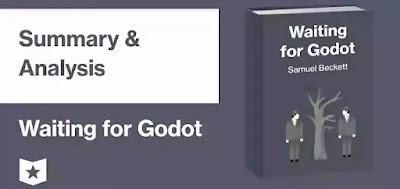Also Read
Summary
The Waiting for Godot (1952) is a play by Samuel Beckett who is a leading exponent of the theatre of the absurd. The play is a four-character play in which there is no plot. It portrays the hopeless condition of mankind in the present age.
The scene is a country road and the scenery is a tree and a low mound. Vladimir and Estragon wait for Godot. They have no precise information about Godot. They discuss how to pass time. They consider hanging themselves, from the tree. They eat turnips and carrots. Pozzo and Lucky enter. Lucky carries luggage and Pozzo holds the rope. Vladimir and Estragon enquire if Pozzo is Godot. Vladimir reproaches Pozzo for thinking of discarding his faithful servant and reproaches Lucky for ill-treating his master. A boy comes with the message that "Mr. Godot would not come this evening but surely tomorrow".
In the next Act, the tree has sprouted four or five leaves. Vladimir and Estragon pass the time in speech because they cannot remain silent. Estragon cannot remember anything about the previous day. They wait and talk. Pozzo and Lucky come. Lucky is burdened as before and Pozzo is blind. But Godot does not turn up.
Critical Analysis
There are absurd happenings and elliptical dialogue. The scene is a Wasteland. Estragon says "Nothing to be done." The play is ambiguous and the characters are uncertain. The ambiguity is the characteristic of the entire play. It depicts the painful confusion and doubts that twentieth-century man experiences when deciding what he should do. The balanced structure in the two acts emphasizes such themes as the repetitive nature of existence, the way chance alters man's condition and the limits of man's memory. Godot is an ambiguous character. Estragon and Vladimir wait for Something that will never happen. The play is about waiting. In Act, Pozzo becomes blind and Lucky deaf. They are deformed by the action of time. Vladimir and Estragon live in hope; they wait for Godot - Godot is explicitly vague mere empty promises. waiting for Godot is a dramatization of the theme of habit, boredom and the suffering of being. The two anti-heroes represent millions of people who live although then life is pointless. Exposed as they are to the daily continuation of then - existence, they cannot help concluding that they must be waiting.
